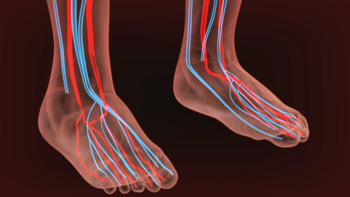
Poor foot circulation occurs when blood flow to the feet is reduced, often leading to coldness, numbness, cramping, or skin discoloration. It can result from underlying conditions, including peripheral artery disease, diabetes, or blood clots. Contributing risk factors include smoking, high blood pressure, high cholesterol, and a sedentary lifestyle. A podiatrist can help identify poor circulation through clinical exams and noninvasive testing. This type of doctor can provide guidance on lifestyle changes, monitor for signs of tissue damage, and offer treatment options to improve vascular health. If you have foot problems related to poor circulation, it is strongly suggested that you are under the care of a podiatrist who can offer appropriate relief tips, and help you to manage this serious condition.
Poor circulation is a serious condition and needs immediate medical attention. If you have any concerns with poor circulation in your feet contact Cory Brown, DPM of Cory Brown, DPM. Our doctor will treat your foot and ankle needs.
Poor Circulation in the Feet
Poor blood circulation in the feet and legs is can be caused by peripheral artery disease (PAD), which is the result of a buildup of plaque in the arteries.
Plaque buildup or atherosclerosis results from excess calcium and cholesterol in the bloodstream. This can restrict the amount of blood which can flow through the arteries. Poor blood circulation in the feet and legs are sometimes caused by inflammation in the blood vessels, known as vasculitis.
Causes
Lack of oxygen and oxygen from poor blood circulation restricts muscle growth and development. It can also cause:
- Muscle pain, stiffness, or weakness
- Numbness or cramping in the legs
- Skin discoloration
- Slower nail & hair growth
- Erectile dysfunction
Those who have diabetes or smoke are at greatest risk for poor circulation, as are those who are over 50. If you have poor circulation in the feet and legs it may be caused by PAD and is important to make changes to your lifestyle in order to reduce risk of getting a heart attack or stroke. Exercise and maintaining a healthy lifestyle will dramatically improve conditions.
As always, see a podiatrist as he or she will assist in finding a regimen that suits you. A podiatrist can also prescribe you any needed medication.
If you have any questions, please feel free to contact our office located in Lewiston, ID . We offer the newest diagnostic and treatment technologies for all your foot care needs.
